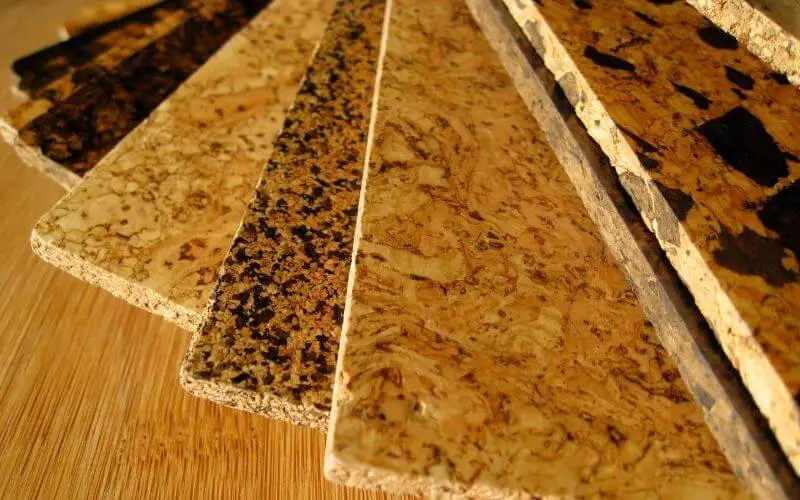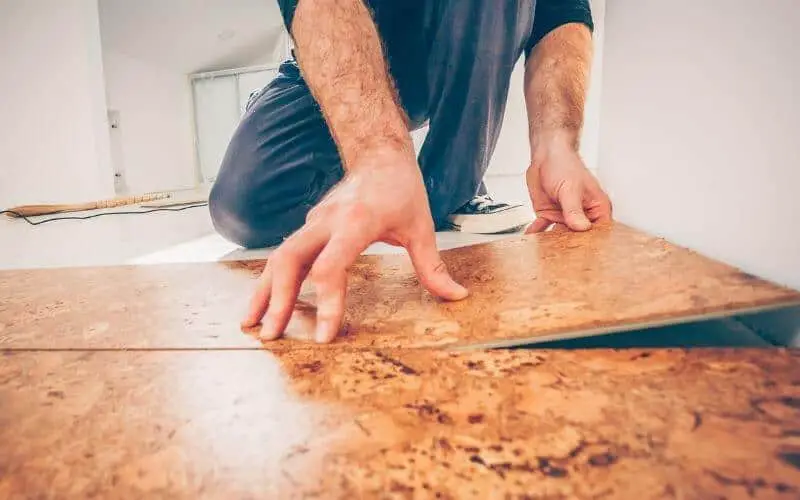Cork flooring has easily replaced hardwoods, probably because it is way more sustainable than hardwoods.
For environmentally-conscious consumers, with the use of cork floorings, they can assuage their guilt that there are not harming the environment in any way.
The use of cork flooring has certain advantages and disadvantages, which necessitated the need of this post on the pros and cons of cork flooring.
Some of the identifiable benefits of using cork flooring stem from the ease and convenience associated with it.
In the same vein, many consumers are not exactly big fans of this flooring because it can easily fade from too much sun.
This post will highlight the pros and cons of cork flooring, which will help you make a wise decision before embarking on any house improvement project.
Related: Pros and Cons of plywood floors
What Is Cork Flooring?
Table of Contents
As the name suggests, cork flooring is gotten from cork bark that comes from cork oak trees or Quercus suber. Most often, cork oak trees are specifically planted to be harvested for commercial purposes.
Cork trees take about 25 years to reach maturity, and at this stage, the bark is harvested or peeled away.
It takes the tree about 12 years to regenerate, making the process of obtaining cork flooring a wholly natural and recurring one as the materials are easily replenishable material.
Cork flooring can also be made from leftover waste material, making cork flooring one of the most eco-friendly types of flooring around! Excess material from wine cork production is ground up, compressed, and formed into sheets bonded with resins.
Related: Pros and Cons of Maple Flooring
Pros and Cons of Cork Flooring
Before embarking on any house improvement project, you must weigh the pros and cons of using a particular material.
When it comes to the use of cork flooring, it may seem that the pros outweigh the cons, which makes it a suitable option for your home.
Pros of Cork Flooring
Cork flooring has many merits, which has fueled its popularity. The durability of this flooring material has made it well-loved among many homeowners. Below are some of the advantages:
1. Top-Notch Comfort
If you are interested in your comfort, then cork flooring is precisely what you need. Cork flooring has a cushioned effect that can absorb cold and stay at room temperature.
If you detest the sound of shoes or feet flapping on the floor, then you should install cork flooring. The soft and cushioned surface of cork flooring reduces noise effects.
This noise-reduction attribute makes cork flooring perfect for bedrooms, living rooms, dens, offices, children’s playrooms, gyms, music studios, dance studios, or any room you want to keep noise in or out.
2. Great Aesthetic Value
If you’re majorly concerned about beautiful patterns and designs, then cork flooring is exactly what you need to install.
Recently, there are thousands of new cork flooring designs that closely resemble hardwood, marble, or even concrete!
Cork tiles have a warm and natural look that perfectly fits most interior styles, both informal and casual decors.
The variety of cork flooring designs in a wide array of colors and grain patterns is all you need for your imagination to soar high!
3. Cork Flooring Is Eco-Friendly.
As mentioned earlier, cork flooring is popular among eco-friendly consumers. With the dangerous rise in deforestation, most consumers are careful not to promote deforestation or harm the environment.
There is a decline in the use of hardwood because it is less sustainable than cork flooring. Hardwood trees take decades to reach maturity, and once they’re cut down and harvested, that is the end of the tree’s life cycle.
This is unlike cork flooring that is obtained from the bark of cork oak trees and takes about 9 years to regenerate.
4. Low Maintenance.
Cork flooring is easy to clean and maintained. With just the occasional sweeping and mopping with a damp cloth, you will have your floor looking clean and shiny.
5. Cheap
When compared to other flooring options, cork flooring is relatively cheap and affordable. Cork flooring can be purchased at about $3 to $8 per square foot.
Also, the charges of hiring a professional installer or contractor to install your new cork tiles are pretty affordable. Cork flooring installation might be charged at around $5 to $7 per square foot.
Related: Pros and Cons of Pine Flooring
Cons of Cork Flooring
While there are some advantages of cork flooring, there are also some disadvantages! Thus, before making any decision, you must be armed with the needed information.
In our opinion, the disadvantages associated with cork floorings are not exactly a dealbreaker.
Below are some of these disadvantages:
1. Cork Floors can Fade from too much Sun Exposure
One of the most common cons of cork flooring is its propensity for UV damage. Long-term exposure to direct sunlight can cause cork tiles to turn yellow and fade.
This simply means that cork may not be the best choice for tanning salons, greenhouses, or sunroom flooring.
2. Cork Flooring Absorbs Water
While most homeowners prefer cork flooring because it is water-resistant, unlike its counterparts, the downside to the water-resistant attribute of cork flooring is that it absorbs water which may eventually cause wood damage.
Read: How to dry water under wood floor
3. Cork Flooring is Susceptible to Scratches from Blunt or Sharp Objects
Cork floorings are made of soft materials and thus cannot hold up weights. Heavy objects such as furniture can cause denting to occur, and sharp objects can leave gashes on your beautiful cork flooring.
You can adopt some protective measures to prevent this from happening, like adding protectors to the leg of furniture, trimming pet nails, and removing your shoes while walking on floors.
4. Professional Installation for Cork Flooring Can Be Pricey
While you may easily install cork flooring yourself, you must have it in mind the installation process can be quite tricky. If you decide to go with professional installation, you might end up paying a bit more than you anticipated.
Installation for cork flooring cost about $1000 per 100 square feet, which is a little more expensive than installing bamboo flooring.
5.Cork Flooring Requires Regular Maintenance
The soft and cushioned nature of cork floors requires that they need to be resealed every few years. Since cork floors are not exactly known for high-level durability, you will need to sweep, vacuum and mop regularly to elongate their life span.
Related: Pros and Cons of Laminate Flooring
Types of Cork Flooring
Cork flooring can be purchased at most major big-box home improvement stores. Below are some of the best cork floors you should be on the lookout for:
1. Globus Cork Flooring
They specialize in 4mm thick cork tiles and are based in New York and ship to all 50 states.
2. WE cork
They are the only US distributor of Corkoleum and sell a wide variety of colorful planks and tiles. They are based in New Hampshire and distribute their product all over the US.
3. ICork
These suppliers specialize in a wide array of tiles (4-8mm thick) and planks (10-12mm thick). They also ship nationwide.
4. APC Cork
They sell a wide variety of tiles and planks. They’re popular for their dedication to sustainability, affordability, and excellent customer service.
5. Heritage Mill
These suppliers target the DIY crowd. They offer a variety of cork planks at Home Depot stores all over the US.
Related: Pros and Cons of Vinyl flooring
Conclusion
As mentioned earlier, we believe that the pros of cork flooring outweigh the cons. However, it all boils down to your personal preference and needs.
Now you know that if you are looking for warm, attractive flooring with your convenience in mind, the cork flooring is your surest bet.
We hope that the information provided in this post on the cork flooring pros and cons will go a long way in helping you decide the best type of flooring for your space.


